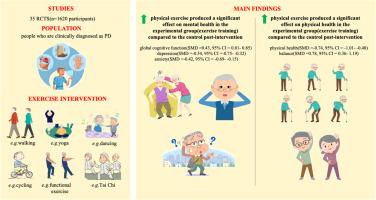不同运动方式对帕金森病患者健康和生活质量的影响:系统回顾和荟萃分析
IF 1.7
4区 医学
Q3 INTEGRATIVE & COMPLEMENTARY MEDICINE
引用次数: 0
摘要
帕金森病(PD)是一种进行性神经退行性疾病,在世界范围内普遍存在,病因不明,目前没有特定的治疗方法。体育锻炼——被定义为“有计划的、有组织的、重复的旨在改善或保持身体健康的体育活动”——已经成为一种非药物的、整体的、以患者为中心的PD治疗干预手段。本研究旨在评估体育锻炼对PD患者身心健康和生活质量的影响。方法系统检索PubMed、Web of Science (WoS)、Embase和Cochrane数据库中自随机对照试验(RCTs)成立至2024年12月的文献。提取的关键数据包括出版物细节、样本人口统计学特征、实验组和对照组使用的干预措施,以及基线和干预后的结果评估特征。采用Cochrane偏倚风险工具评估偏倚风险,采用推荐、评估、发展和评价分级(GRADE)框架评估证据的确定性。结果我们的系统综述共纳入54项研究的35篇符合条件的文章(n = 1620)。结果表明,体育锻炼干预对各种结果有很大的影响,包括全球认知功能(SMD 0.43, 95%可信区间0.01到0.85,p = 0.04),抑郁(SMD -0.54, 95%可信区间-0.75到-0.32,p & lt; 0.00001),焦虑(SMD -0.42, 95%可信区间-0.69到-0.15,p = 0.002),身体健康(SMD -0.74, 95%可信区间-1.01到-0.48,p = 0.0002),平衡(SMD 0.78, 95%可信区间0.36到1.19,p & lt; 0.00001),疲劳(SMD -0.65, 95%可信区间-1.28 - 0.01,p = 0.05),和生活质量(SMD -0.51, 95% CI -0.80 ~ -0.22, p = 0.0005),实验组(运动训练)干预后与对照组相比。大多数研究被评估为低偏倚风险,纳入研究的质量普遍较高(PEDro中位评分= 7,范围5-10)。35项试验中仅有5项报告了不良事件,发生率低(3.1 - 16.1%),严重程度轻微(如肌肉骨骼不适)。结论本综述发现中等确定性证据表明体育锻炼可以改善抑郁、身体健康、平衡和生活质量,低确定性证据表明体育锻炼可以改善认知功能、焦虑和疲劳。进一步的研究表明,运动对帕金森病的有益影响将提供更清晰的见解。本文章由计算机程序翻译,如有差异,请以英文原文为准。

Effect of different exercise modalities on health and quality of life in people with Parkinson’s disease: A systematic review and meta-analysis
Introduction
Parkinson's disease (PD) is a progressive neurodegenerative disorder, prevalent worldwide, with an unknown etiology and currently no specific treatment. Physical exercise-defined as “planned, structured, and repetitive physical activity aimed at improving or maintaining physical fitness”-has emerged as a non-pharmacological, holistic, and patient-centered intervention for the management of PD. This study aims to evaluate the impact of physical exercise on mental and physical health, and the quality of life in individuals with PD.
Method
A systematic search was conducted in PubMed, Web of Science (WoS), Embase, and the Cochrane Database for randomized controlled trials (RCTs) from their inception until December 2024. Key data extracted included publication details, sample demographic characteristics, the interventions used for both experimental and control groups, and outcome assessment characteristics at baseline and post-intervention. The Cochrane Risk of Bias tool was utilized to assess the risk of bias, and the Grading of Recommendations, Assessment, Development, and Evaluation (GRADE) framework was applied to evaluate the certainty of the evidence.
Result
A total of 35 eligible articles (n = 1620) from 54 studies were included in our systematic review. The results demonstrated that physical exercise interventions had a significant effect on various outcomes, including global cognitive function (SMD 0.43, 95 % CI 0.01 to 0.85, p = 0.04), depression (SMD -0.54, 95 % CI -0.75 to -0.32, p < 0.00001), anxiety (SMD -0.42, 95 % CI -0.69 to -0.15, p = 0.002), physical health (SMD -0.74, 95 % CI -1.01 to -0.48, p = 0.0002), balance (SMD 0.78, 95 % CI 0.36 to 1.19, p < 0.00001), fatigue (SMD -0.65, 95 % CI -1.28 to - 0.01, p = 0.05), and quality of life (SMD -0.51, 95 % CI -0.80 to -0.22, p = 0.0005) in the experimental group (exercise training) compared to the control post-intervention. Most studies were assessed as having a low risk of bias, the quality of the included studies was generally high (median PEDro score = 7, range 5–10). Adverse events were reported in only 5 of 35 trials, with low incidence (3.1–16.1 %) and mild severity (e.g., musculoskeletal discomfort).
Conclusion
This review found moderate certainty evidence that physical exercise can improve depression, physical health, balance and quality of life, and low certainty evidence for improvements in cognitive function, anxiety and fatigue. Further research is indicated to provide clearer insights about the beneficial effects of exercise for PD.
求助全文
通过发布文献求助,成功后即可免费获取论文全文。
去求助
来源期刊

European Journal of Integrative Medicine
INTEGRATIVE & COMPLEMENTARY MEDICINE-
CiteScore
4.70
自引率
4.00%
发文量
102
审稿时长
33 days
期刊介绍:
The European Journal of Integrative Medicine (EuJIM) considers manuscripts from a wide range of complementary and integrative health care disciplines, with a particular focus on whole systems approaches, public health, self management and traditional medical systems. The journal strives to connect conventional medicine and evidence based complementary medicine. We encourage submissions reporting research with relevance for integrative clinical practice and interprofessional education.
EuJIM aims to be of interest to both conventional and integrative audiences, including healthcare practitioners, researchers, health care organisations, educationalists, and all those who seek objective and critical information on integrative medicine. To achieve this aim EuJIM provides an innovative international and interdisciplinary platform linking researchers and clinicians.
The journal focuses primarily on original research articles including systematic reviews, randomized controlled trials, other clinical studies, qualitative, observational and epidemiological studies. In addition we welcome short reviews, opinion articles and contributions relating to health services and policy, health economics and psychology.
 求助内容:
求助内容: 应助结果提醒方式:
应助结果提醒方式:


